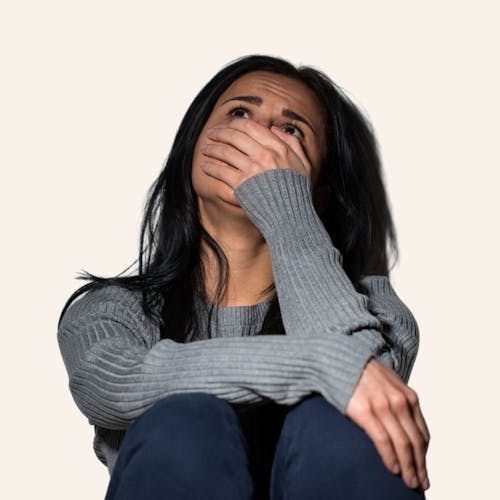This website uses cookies to enhance the user experience. By using Yoppie you are agreeing to our use of cookies.
What's Up With PMS & Anxiety Attacks?
Written by Yoppie
18 Feb 2022
What is an anxiety attack?
Why do anxiety attacks happen?
Could PMS be the cause of anxiety?
Could I have PMDD?
How do I handle anxiety attacks?
Should I see a doctor about PMS anxiety?
If you suffer from anxiety attacks, you’ll know how scary, inconvenient and downright annoying they can be… but what triggers them? There are lots of reasons an anxiety attack might rear its ugly head, and turns out your PMS could be to blame. We’re looking at what anxiety attacks actually are, why hormones could be responsible, and how to manage them.
What is an anxiety attack?
You’ll likely have heard the terms ‘anxiety attack’ and ‘panic attack’ used interchangeably as the symptoms are often the same, but there are some differences between the two. Symptoms of anxiety and panic attacks include a sudden, intense feeling of anxiety or fear, racing heartbeat, feeling faint or dizzy, feelings of losing control, sweating, shaking, rapid breathing, a tingling feeling, nausea, and more.
These can last anywhere from 5 to 30 minutes, and although they’re scary, they aren’t physically dangerous. Sometimes it can be hard to distinguish the difference between a panic attack and anxiety attack, but it’s thought that anxiety attacks are mostly triggered by something seemingly stressful or threatening, and can have different levels of intensity, while panic attacks are immediately very intense and seem to appear out of nowhere.
Why do anxiety attacks happen?
Looking at general anxiety, there are many reasons why this occurs. Common causes are anything that induces stress, like work pressure, financial issues, family or relationship issues, big life changes like moving house, divorce or death, and more. Other conditions that can trigger more severe anxiety attacks include social phobias, (PTSD) post-traumatic stress disorder, certain medications, or having a history of substance abuse.
Unfortunately, when it comes to anxiety and panic attacks, there’s often a vicious cycle at play; the person experiencing them becomes fearful of having another attack in public or a specific situation, and avoids this situation, leading to stress, leading to further attacks.
Dan Harris, an American television host and author of the book 10% Happier, famously experienced a panic attack live on television, and realised his hectic lifestyle was to blame:
“... what I had experienced on air was an overwhelming jolt of mankind’s ancient fight-or-flight response, which evolved to help us react to attacks by sabre-toothed tigers or whatever.” - Dan Harris, author of 10% Happier
Could PMS be the cause of anxiety?
For people with periods, the cause of anxiety and panic attacks could be a little different. Anxiety in general is a common symptom of PMS, due to changing levels of the hormones estrogen and progesterone. When levels rise and fall frequently during your cycle it can affect the neurotransmitters in your brain, like serotonin and dopamine, which control your mood. This is what leads to emotional symptoms of PMS such as depression, mood swings, and our old friend anxiety.
Research suggests if you already suffer from anxiety attacks or panic attacks, then your PMS could intensify these. Also, if you suffer from a more severe form of PMS, called PMDD (premenstrual dysphoric disorder), this can cause panic attacks. One study suggests people with periods may be more susceptible to panic attacks due to hormones making them more reactive to external stressors. Another study confirms this, finding 41% of the sample reported “premenstrual worsening of panic symptoms”.
Could I have PMDD?
Panic attacks are a recognised symptom of PMDD (premenstrual dysphoric disorder) so if you suffer from these attacks around the same time each month, look out for other symptoms of PMDD, which include an intense irritability or anger that can affect your relationships, extreme feelings of sadness or despair, or even thoughts of suicide, intense anxiety, brain fog, fatigue, trouble sleeping, and more. If you suffer from several of these symptoms then PMDD is a possibility, and you should discuss this with your doctor.
How do I handle anxiety attacks?
Managing anxiety attacks or panic attacks is easier said than done, as they can be very scary in the moment. If you are worried about anxiety attacks in day-to-day life, there are some things you can do to help prepare and ease them quicker. When an attack comes on, counting slow, deep breaths can help, but it’s mostly about remembering some key information until it passes. If possible, keep in mind:
- You’re not trying to fight the attack - just let it pass
- It’s not life-threatening, even if it feels like it in the moment
- It will pass, sometimes in a matter of minutes
- No one around you is judging you, they only want to make sure you are OK
After an attack, pay attention to what your body needs, rest up, and if you feel up to it, tell someone you trust what happened. If you spend a lot of time with this person, let them know the signs to watch out for so they know if you’re having another one, and what to say to help you get through it.
Should I see a doctor about PMS anxiety?
Having anxiety attacks at certain times during your cycle should put your mind somewhat at ease, as this confirms it’s a hormone issue and there’s nothing physical to worry about. That said, it doesn’t make them more fun or easier to manage!
If you experience attacks throughout the month, or severe panic attacks, it’s best to speak to your doctor so they can ensure any other symptoms (such as a racing heart, nausea, etc.) are nothing serious, and start treatment that may include psychotherapy or medication.
Do you suffer from PMS-related anxiety or panic attacks? We’d love to know your tips for managing them in daily life. Chat to others about this over in our Full Stop FB group, or reach out to us on Instagram at @itsyoppie. Don't forget that our personalised menstrual cycle subscription box can get organic tampons, PMS supplements and much more delivered easily and regularly through your letterbox, which is one less thing to worry about through the month.
Section jump
Back to top
Subscribe To Our Newsletter
YOPPIE





© 2024 Yoppie is a registered trademark of Phlo Technologies Ltd.
Yoppie's supplements are not a substitute for a varied diet and healthy lifestyle and are not intended to diagnose, treat, or cure any disease. If you are pregnant, breastfeeding, have a medical condition or are under medical supervision, please consult with your doctor before taking any of our products.






